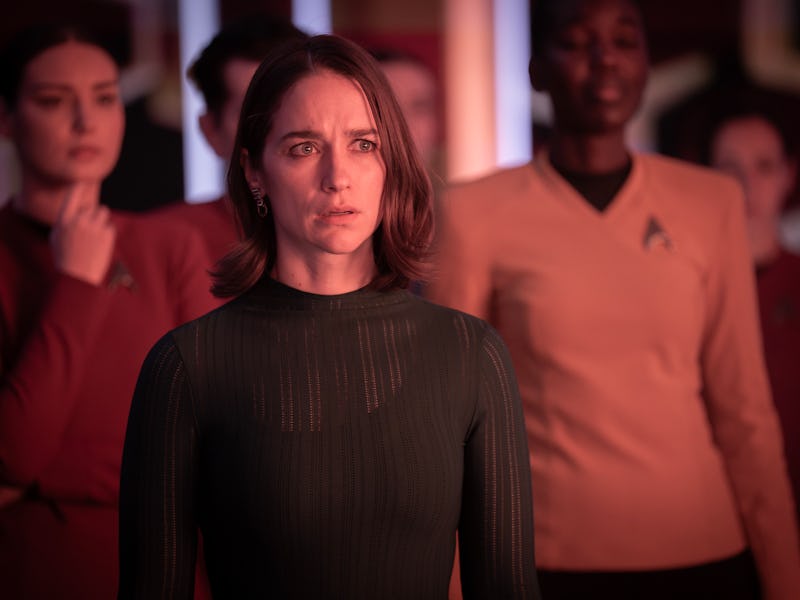Star Trek Has Finally Unpacked Its Oldest Paradox
What is the point of Starfleet, anyway?

The popular, socially conscious reputation of Star Trek often doesn’t match up with the reality of its basic status quo. Hardcore fans will tell you that Trek is good for the world because it reveals a hopeful future in which humanity is united, and super tolerant and accepting of all sorts of different lifeforms. And yet, Trek is also a pew-pew action-adventure series, and has been from the start. If you look at the early history of the franchise, there are no memos to the writers during the course of The Original Series about a “hopeful future.” There’s also nothing in the way that Gene Roddenberry pitched the series that suggests that the show was trying to portray Starfleet and its officers as aspirational or politically motivated people. Instead, the ethical, peace-loving aspect of Star Trek is somewhat intertwined with the fact that if you squint, the format of the franchise leans toward military science fiction.
And, now, 59 years after the debut of Star Trek in 1966 (an episode in which the crew murders a monster and feels slightly bad about it), Strange New Worlds has dropped an episode called “What Is Starfleet?” And, in this episode, the franchise has delivered an interesting and revealing introspective story that unpacks the inherent paradox at the heart of Starfleet: How can a warship also be a ship of peace?
Spoilers ahead.
The crew is initially very tight-lipped about this particular mission. But, is that a good thing?
As one of the tighter and shorter episodes of Strange New Worlds Season 3, “What is Starfleet?” presents itself as a mini-documentary created by Beto Ortegas (Mynor Luken), brother of Erica Ortegas (Melissa Navia), and a visiting civilian on the USS Enterprise. The episode starts with an assertion from Beto that has come up often: The Enterprise is heavily armed and could easily overpower many of the strange new worlds that it visits. So, does Starfleet explore, or does Starfleet simply enforce the legal policies of the United Federation of Planets?
Longtime fans can already answer this question with the word “both.” Because the truth is, some of Star Trek’s best moments are when Federation/Starfleet policy comes into conflict with the ethics that Starfleet supposedly tries to uphold. The entire premise of the film Star Trek: Insurrection rests on this premise: that Captain Picard won’t follow Starfleet orders, because he views those orders as corrupt. In Star Trek VI: The Undiscovered Country, several Starfleet officers conspire to stop a peace treaty with the Klingons because they feel that it goes against the core of Starfleet to enter into such an arrangement. In Insurrection, we side with Picard because when he breaks Starfleet rules, he does it for a good reason. In The Undiscovered Country, we obviously don’t side with the conspirators, because they’re anti-peace. However, the paradox is clear: Characters are often remonstrated within Trek for not following orders, and sometimes that’s viewed as a good thing, and sometimes that’s viewed as a bad thing.
With “What is Starfleet?” the Enterprise is assigned by Starfleet to assist an alien race called the Lutani, who, we’re told, have had some shady operations in the past. The job is to transport a space-dwelling alien for the Lutani, which quickly is revealed to be an enslaved creature with immense destructive power. Initially, the mission is totally classified, and because the story is told as an investigative documentary, the audience has less inside information than usual. Trek has done secret mission stories like this before (in fact, the TNG episode “Lower Decks” was one such example), but in “What is Starfleet?” it’s not just a question of uncovering the classified nature of the mission, it's the fact that Beto has basically put Starfleet on trial for being unethical.
This idea cuts both ways because, on the one hand, Beto is focusing on a mission that, arguably, is atypical of what the Enterprise generally does. On the other hand, as the episode makes very clear, the Federation is very much in the business of making shady deals with worlds that are outside of its member worlds. In one very tense scene, Beto tells Uhura he thinks that “these are the actions a colonizer takes.”
Uhura and Beto are buddies by the end of this episode. But that doesn’t mean Beto was totally wrong.
In the end, Beto sort of backs off this thesis, because Pike and the rest of the Enterprise crew side with the beautiful, butterfly-like “Jikaru” alien. In essence, Pike violates his orders, so that the crew honors the higher, standing orders of Starfleet: To try and help alien life. That said, the Jikaru still perishes.
Ultimately, the flaws in Starfleet aren’t erased by the noble attempts of the crew. Beto’s documentary concludes on a hopeful note, but his initial distrust of Starfleet isn’t actually negated at all. In various versions of Trek, the Enterprise crew is seen as exceptional. But that doesn’t mean that the most hopeful space military in all of science fiction isn’t still, on some level, a space military.
Strange New Worlds doesn’t fully resolve this question, which is part of what makes this episode a good example of what the Star Trek franchise is known for. Yes, there’s hope and optimism. But it’s not just hope and optimism for the sake of it. There’s a ton of conflicting ideas here, too. Starfleet is cool and aspirational, but as this episode confirms, it’s not even remotely perfect.